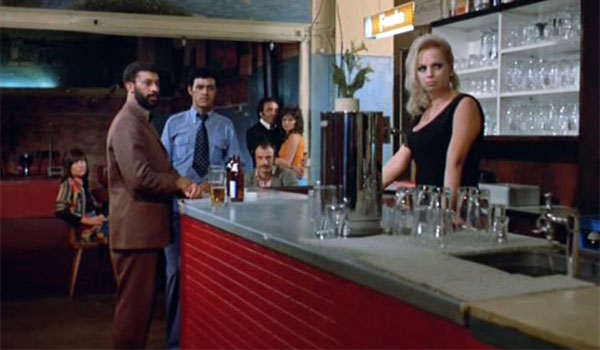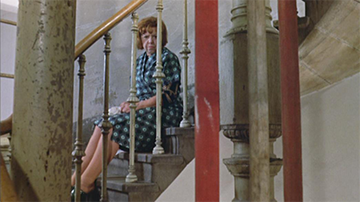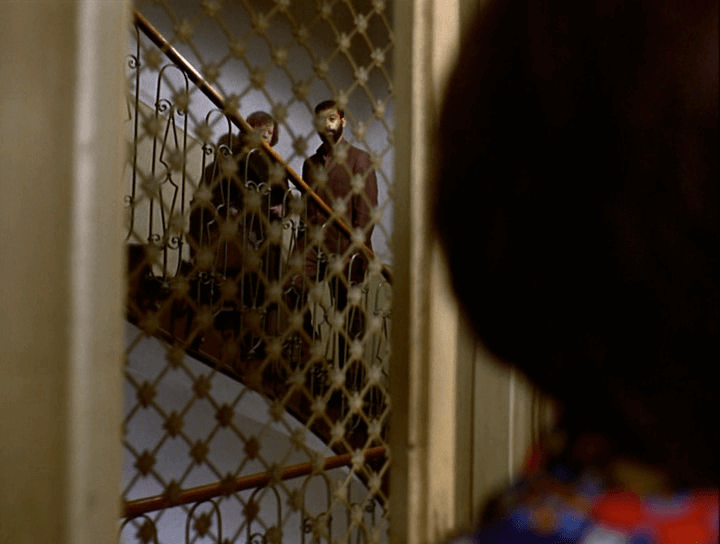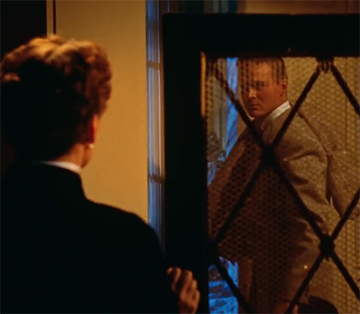HUM 425-01 | Thought and Image
Fall 2018
This Course is Fully Online.
Office: HUM 416, Office Hour: Wednesday 2:00 – 3:00 PM, via Zoom, iLearn, email, or appointment.
E-mail: theory at sfsu dot edu | Office Phone: 415-338-1154 (no voice mail)
Course Website: https://melodrama.io
Prerequisite: ENG 114 or equivalent.
Electronic version of course syllabus
This course satisfies the following requirements: GE Segment Three.
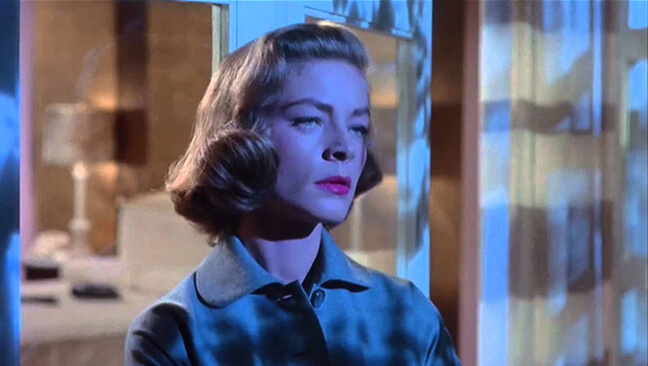
This course comparatively reads the melodramas of Douglas Sirk, Todd Haynes, and Ranier Werner Fassbinder alongside the concept of dispositif (apparatus, or concrete social formation) in the social theory of Michel Foucault and Giorgio Agamben.
Using Brecht’s revolutionary theater techniques—variously referred to as distanciation, alienation, Verfremdungseffekt (don’t worry, I can’t say it either)—but extending them further in cinematic language through the subversive use melodrama (Sirk referred to his films as experiments in the form), Sirk’s 1950’s films are exquisitely crafted critiques of American society, showing even in their architecture the complex forms of social control surrounding gender, race, and class. Frequently staged on lush sets and filmed in gorgeous technicolor—often completely over the top, a bit too much might be an understatement—Sirk’s films are the very definition of art and distance.
Our first melodrama will be Douglas Sirk’s most contained experiment with the form: his critique of patriarchy, class, and American society in All That Heaven Allows (1955). We will then do a close reading of Michel Foucault’s “Means of Correct Training” from his Discipline and Punish in order to make use of these tools throughout our study. After All That Heaven Allows, the first half of the semester will include Todd Haynes’ 2002 homage to the films of Sirk, Far from Heaven, and Rainier Werner Fassbinder’s 1973 tribute, Ali: Fear Eats the Soul.
Students will be introduced to the concept of mise-en-scène as a primary tool for thinking the art of cinema, and to melodrama as a genre classification. In the second half of the semester, we will use these analytical tools to further study films, think melodrama in relation to Guy Debord’s concept of spectacle, and consider Elizabeth Anker’s provocative thesis on melodrama and politics in the post 9/11 era: that our contemporary political world is best read through the lens of the soap opera. At the end of the semester, students will be able to select a melodrama of their own choosing to research and write about as part of their final paper assignment. Students will be consulted about the works we choose to study in the second half of the semester (for approximately three weeks of the schedule) or, alternately, if we choose expand our analysis of other themes from the first part of the semester. We will make these decisions together: this is your class. Everyone is welcome in this class. It is important that we create a shared learning environment where everyone is allowed to have a voice. Given what is happening in the world, it is important that we strive to be supportive and respectful of our differences, our contributions, and our points of view. This is an inclusive class in every sense of the word.
Required Articles (available as PDF’s)
- Agamben,“What is an Apparatus?”
- Elizabeth Anker, Orgies of Feeling: Melodrama and the Politics of Freedom (selections)
- Michael Camille, “Simulacrum” or, Brian Massumi, “Realer than Real”
- Guy Debord, “Separation Perfected” from Society of the Spectacle
- Elssaesser, “Tales of Sound and Fury”
- Ranier Werner Fassbinder, “Imitation of Life: On the Films of Douglas Sirk“
- Ranier Werner Fassbinder, “Five Interviews”
- Ranier Werner Fassbinder, “I Let the Audience Think and Feel”
- Mark Fisher, “Reflexive Impotence” from Capitalist Realism
- Michel Foucault, “The Means of Correct Training“
- Haynes, Three Screenplays (selections)
- Haynes, “Movies Mean Nothing Until We Give Emotional Life to Them”
- Haynes,“Heaven Sent”
- Todd Haynes, “A Scandal in Suburbia: Interview with Todd Haynes and Edward Lachman” Interview with Todd Haynes and Edward Lachman by Jon Silberg on Far From Heaven from American Cinematographer (December, 2002)
- “Todd Haynes” by Alison Maclean
- “Antibodies” Larry Gross Talks with Safe’s Todd Haynes
- John Mercer & Martin Shingler, Melodrama: Genre, Style, and Sensibility (selections)
- Gabe Moura, “Mise-en-scène” (PDF version)
- Jane Stern/Michael Stern, “Two Weeks In Another Town: An Interview with Douglas Sirk” (Link to article on website)
- Jane Stern/Michael Stern, “Two Weeks in Another Town Interview with Douglas Sirk” (PDF version)
Optional articles
- Jean-Loup Bourget, “Sirk’s Apocalypse” (optional)
- Canguilhem,“Machine and Organism” (optional)
- Foucault, “Governmentality” (optional)
- Foucault, Abnormal (selection) (optional)
- Michel Foucault, “Panopticism” (optional)
- Foucault,“Introduction” to The Normal and the Pathological (by Canguilhem) (optional)
- Thomas,“10/40/70: Ali:Fear Eats the Soul” (optional)
- Agamben, “Difference and Repetition: On Guy Debord’s Films” (optional)
- Mckenzie Wark, The Spectacle of Disintegration (selections)
- Todd Haynes, “Karen Carpenter: Getting to the Bare Bones” … and “Cinematic/Sexual” (interviews)
- Adrian Martin, Mise-en-scène: From Classical Hollywood to New Media Art (selections), x-20, 43-73, and 178-204
Handouts
- Handout on All That Heaven Allows
- Handout-on-mise-en-scéne
- Study Questions on [SAFE]
- Study Questions on All That Heaven Allows
Films (Viewed in Class)
- Douglas Sirk, All That Heaven Allows (USA/1955)
- Todd Haynes, Far From Heaven (USA/2002)
- Ranier Werner Fassinder, Ali: Fear Eats the Soul (West Germany/1973)
- Todd Haynes, Safe (USA, 1995)
- Todd Haynes, Superstar: The Karen Carpenter Story (USA/1987)
- Wong Kar-Wai, In the Mood for Love (Hong Kong, 2000)
I am setting aside two weeks towards the end of the semester for student directed research as part of your final paper assignment
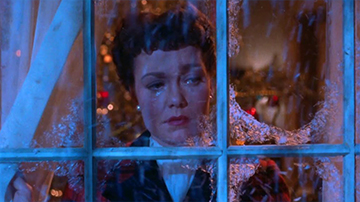
My subject is the exploitability of feelings, whoever might be the one exploiting them. It never ends. It's a permanent theme. Whether the state exploits patriotism, or whether in a couple relationship, one partner destroys the other
—Ranier Werner Fassbinder
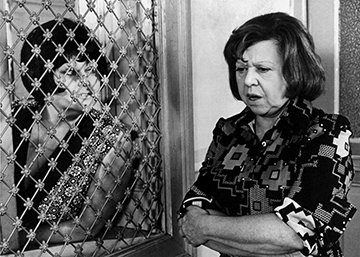
. . . they are all trying desperately to make their thoughts and desires their own ... None of the protagonists come to see that everything, thoughts, desires, dreams arise directly from social reality or are manipulated by it
—Ranier Werner Fassbinder, on Douglas Sirk's Imitation of Life.

